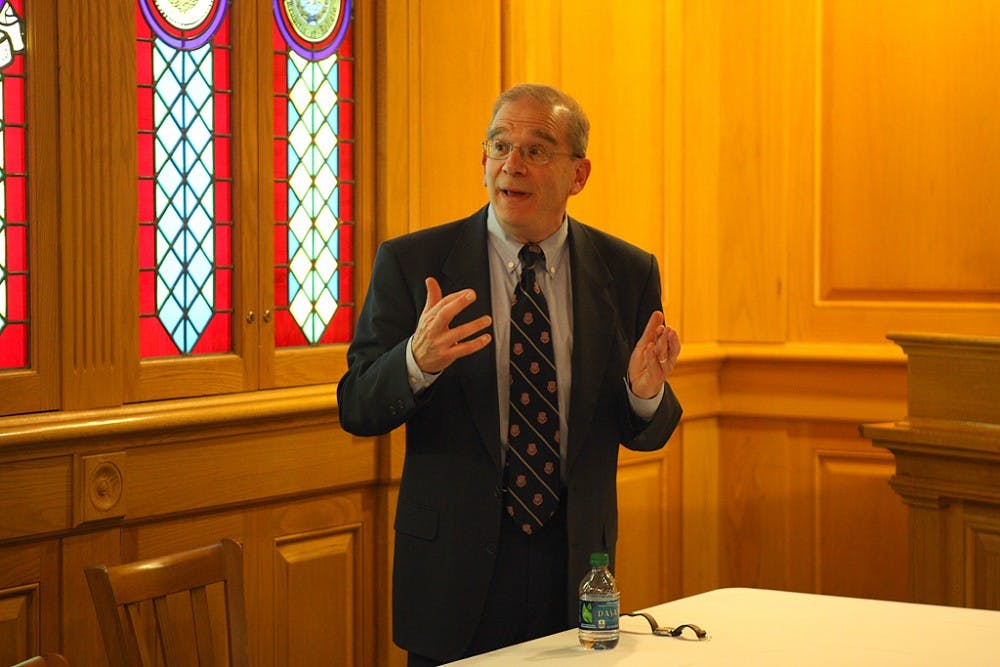Although Iran’s nuclear capability may pose threats, war is not the answer, said Steven David, vice dean for undergraduate education at Johns Hopkins University.
David spoke to a group of more than 80 people about tensions between Israel and Iran given Iran’s nuclear ambitions at the Old Trinity Room Tuesday night. The talk, titled “Israel and Iran: Countdown to War?” was organized by the Duke chapter of the Alexander Hamilton Society, a nonpartisan group that organizes debates on topics including foreign policy and national security.
Based on Iran’s geographical position within the Middle East—surrounded by enemy states and situated near U.S. troops in Afghanistan and Iraq—it is rational for the state to develop nuclear weapons against the wishes of both the United States and Israel, he said. David argued, however, that economic sanctions, and not preemptive strikes, are the best solution to the conflict, adding that he does not think Israel will ultimately attack Iran—despite the seemingly poor forecast.
“You put all of this together, and it looks like [Iran] is hell-bent on developing nuclear weapons,” he said. “I know no one who doubts that.”
The vast majority of Muslims worldwide are Sunni Muslim. Most of the Middle East sees Iran—a Shiite state—as a threat, David said, adding that countries like Saudi Arabia with significant Shiite populations are unnerved by Iranian expansionist impulses. If Iran obtained weapons of mass destruction, it would have destabilizing effects on the region, David noted.
Iran’s nuclear program would still pose risks even if it was not used to target other countries, David said. There is a possibility, for instance, that unintentional conflict could arise from an unauthorized nuclear launch.
Israeli leaders are worried about Iran’s nuclear armament and have considered preemptive strikes against the country’s nuclear facilities. Even if Israel is 90 percent certain that Iran will not bomb its territory, it still does not want to take a 10 percent chance, David noted. Fifty percent of the country’s population lives in three cities, making Israel even more vulnerable to attack.
“The Jewish people have been down that road before, and it didn’t work out so well,” he said.
Allusions to the Holocaust have played a role in rhetoric toward Iran, David said. During World War II, when one-third of the world’s Jews were killed, the world did not care, he explained. As a result, many Jews have come to see the existence of the Israel as a means to defend themselves.
To prevent a nuclear Iran, in the past few years Israel has allegedly employed covert tactics against Iran like assassinations of at least four Iranian nuclear scientists and computer virus attacks on the country’s nuclear facilities. These strategies have had a limited effect, David argued, adding that economic sanctions against Iran have been more effective.
Iran, an active member of the global market, depends on oil for about 60 percent of its government spending. If the country’s economy suffers, however, Iranian support for the nuclear weapons program will decrease, David said.
David added that waging war against Iran would be a more difficult undertaking than previous operations Israel has undertaken against nuclear reactors in Syria and Iraq because many reactors are built underground. Additionally, Iranian retaliation could involve risks like potential attacks against America, retaliation from Hamas and Hezbollah and the closure of the Strait of Hormuz. David expects Israel to wait until sanctions against Iran are fully in place before considering further action, at which point he believes Israel will no longer consider striking Iran.
Sophomore Daniel Strunk, vice president for programming for the AHS, said David’s insight was particularly relevant.
“[The event was AHS’s] best of the year so far. [It had] fantastic attendance and an even better discussion on an issue that hits home with lots of Duke students,” he said.
Senior Alex Young noted that David’s speech was particularly informative.
“I didn’t know a lot going into it, but I feel I have a better [understanding of] the situation with Iran’s nuclear arsenal,” Young said.
Get The Chronicle straight to your inbox
Signup for our weekly newsletter. Cancel at any time.

